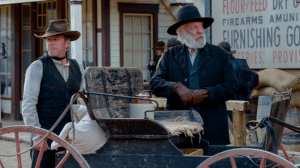It’s 2024 and the pandemic has continued to rage, ravage, and mutate around the world. We’re on COVID-23 now, and everyone is living under martial law. Only the immune identified by a bright yellow bracelet can leave their homes; the bracelets are highly coveted but maybe not so great to get, because if you choose to live on the outside (probably for work), you have to live completely alone, isolated, in designated areas. It’s much worse to be sick, though, or to have lived with someone who became infected – those people are taken forcibly to the “Q-zone” which sounds pretty terrible. And while that would certainly be an interesting movie, this movie is focusing on just a handful of people as they try to avoid it.
Nico (KJ Apa) is a courier, one of those essential services we learned were pretty priceless while we locked down last winter. In 2024, couriers like him are basically the ones keeping the world turning. He’s deeply in love with Sara (Sofia Carson), who is not immune, hence the fact that they’ve never been in the same room. Their relationship is conducted through closed doors and over video chat, with no end in sight. She lives with her grandmother, and every day their phone beeps, giving them five minutes to complete mandatory virus checks.
William (Bradley Whitford) and Piper (Demi Moore) try to conduct their business from home while protecting their immuno-suppressed daughter from outside threats. Plus, you know, if a non-immune person tries to leave their home, they’ll be shot on sight. There’s also that. William has a yellow bracelet (though not necessarily the immunity that goes with it), and risks the outside to visit sex worker May (Alexandra Daddario) who struts in her stuff in lingerie and bedazzled face shield.
Lester (Craig Robinson) sits in he safety of his lair, conducting Nico and other couriers around the city as Dozer (Paul Walter Hauser) provides support via drone.
And Emmett Harland (Peter Stormare) is the dirt bag Department of Sanitation head who seems to enjoy hunting people down for government-sanctioned murder. An unlikely appointee, Emmett got to his position by watching everyone above him die of the virus, and now he’s enjoying every privilege his immunity can steal for him.
These are the people meeting their destinies in Songbird, which as you can imagine, was conceived, written, and filmed during our own (ongoing – stay home, be safe) pandemic.
I understand the temptation to be among the first to be telling stories about our global crisis, but you can kind of tell this movie was thrown together quickly, and worse still, that it doesn’t have much to say about it, or know what the take-away should be. If you remove the COVID gimmick, it’s a pretty half-baked movie. It relies on dangerous, ugly fear-mongering, pushing conspiracy theorists’ buttons and fueling the fire of anxiety in an already uneasy time.


 she actually loves. Oh to be rich and luxuriously useless!
she actually loves. Oh to be rich and luxuriously useless! the fun gets spoiled when the stripper gets accidentally murdered, and the hen party suddenly has to hide the dead rooster. The situation is wildly implausible and uncomfortably phony. Some have complained that the script focuses more on comedy than on story, and while I agree that story was largely absent, so were the jokes. I don’t think I laughed once, and I love me some Kate McKinnon.
the fun gets spoiled when the stripper gets accidentally murdered, and the hen party suddenly has to hide the dead rooster. The situation is wildly implausible and uncomfortably phony. Some have complained that the script focuses more on comedy than on story, and while I agree that story was largely absent, so were the jokes. I don’t think I laughed once, and I love me some Kate McKinnon. husband’s just left her for a secretary a fraction of her age. Eva’s been caring for her sick husband for a long time, so washes away her guilty feelings with generous dosages of mojitos and embraces the mistake, determined to live it up. These two chiquitas have nothing to lose so it’s all blackjack and boy toys until a) a dashing Billy Connolly enters the picture and b) the fuzz are on their tail. Well, not so much the fuzz as the insurance company trying to reclaim their losses, but you get the picture.
husband’s just left her for a secretary a fraction of her age. Eva’s been caring for her sick husband for a long time, so washes away her guilty feelings with generous dosages of mojitos and embraces the mistake, determined to live it up. These two chiquitas have nothing to lose so it’s all blackjack and boy toys until a) a dashing Billy Connolly enters the picture and b) the fuzz are on their tail. Well, not so much the fuzz as the insurance company trying to reclaim their losses, but you get the picture.

